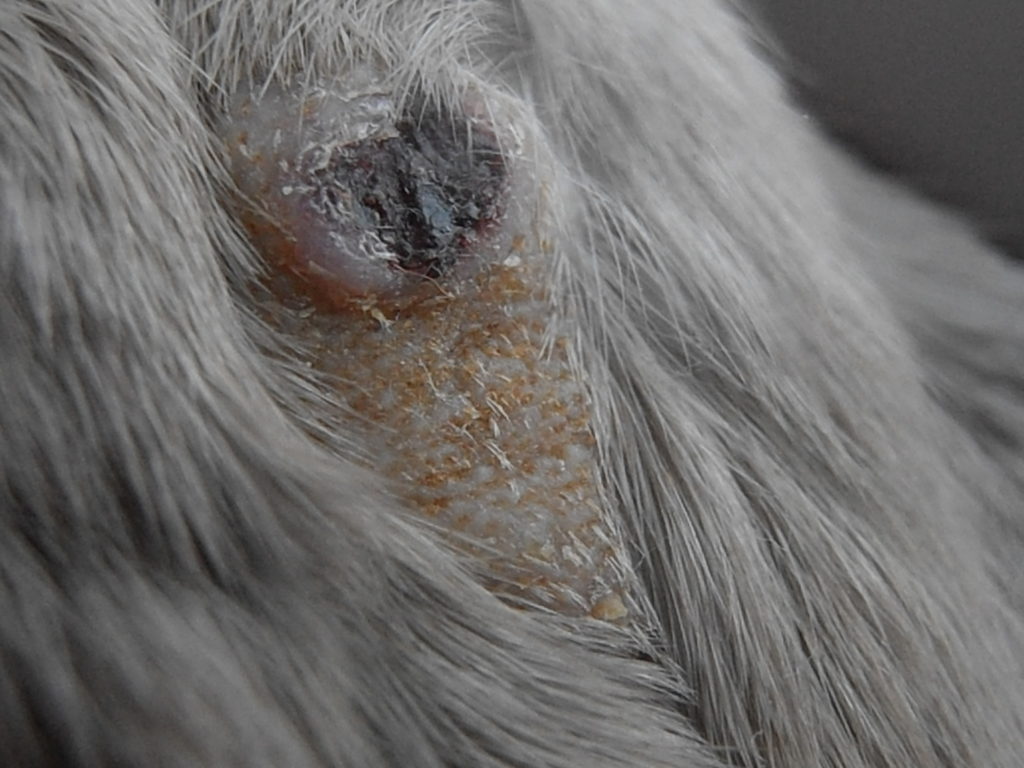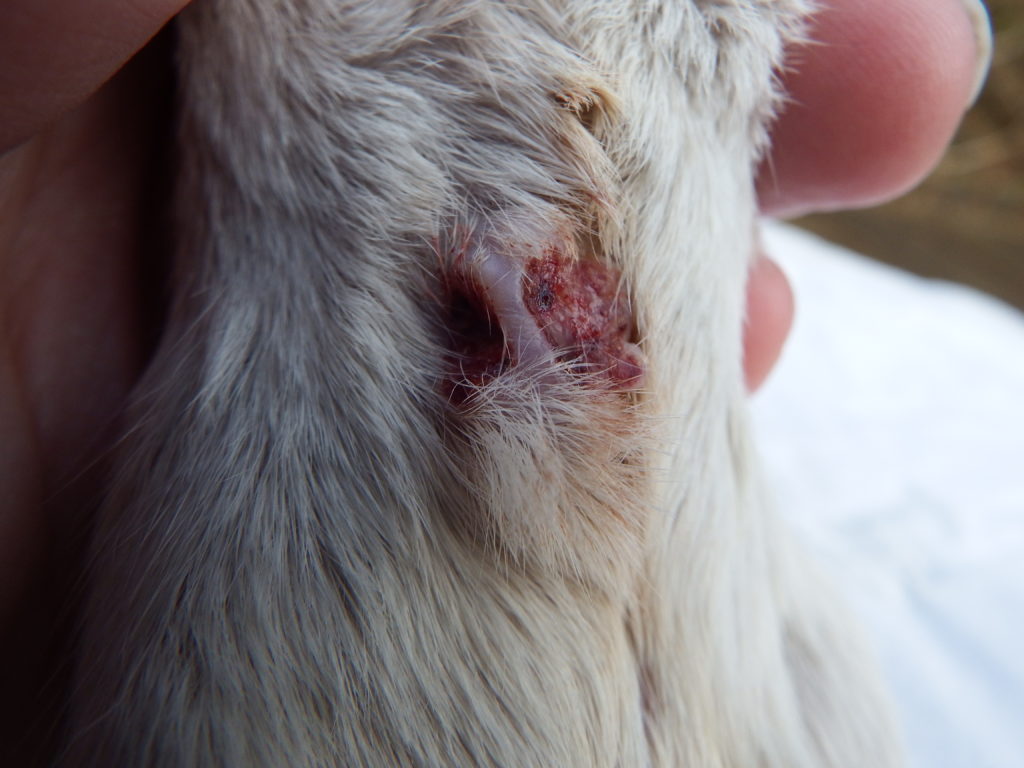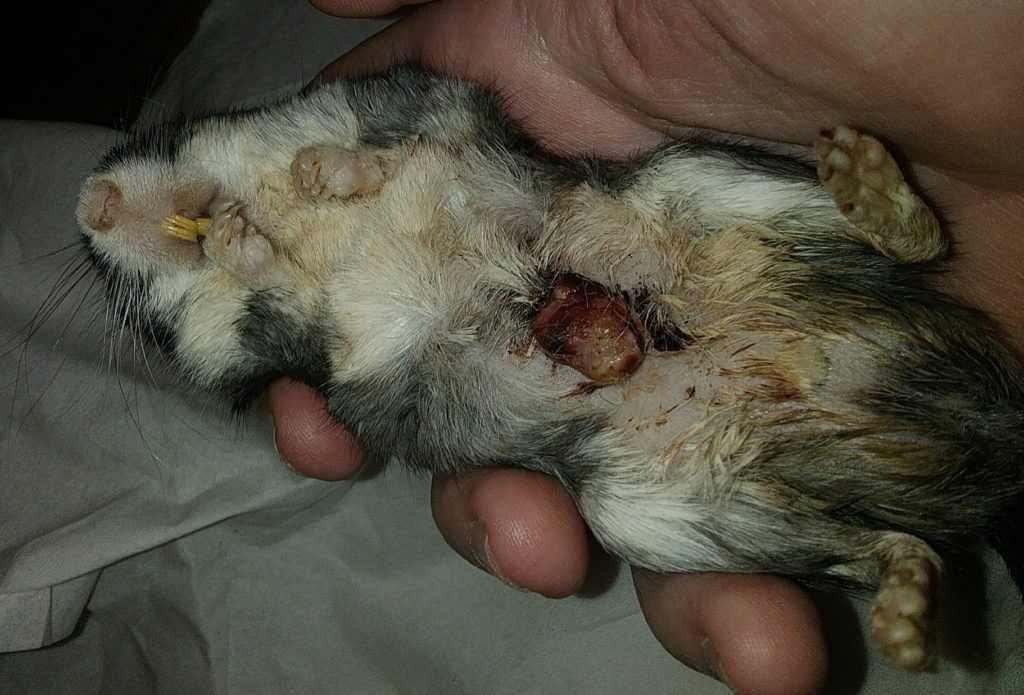Scent gland tumours (or SGTs) are no fun – for you or your gerbil – but they occur quite regularly.
More so, they are found in dominant males – certainly the majority of mine have been – but they can be found growing on any gerbil.
NB: This article contains real images of progressively worse scent gland tumours.
There are really only two options for treatment here; once a tumour has been spotted: One has an unknown outcome which you have no control over, but which could result in a perfectly healthy pain-free gerbil existence to normal old age; the other has a known outcome that you have total control over, but which results in a continual, and eventially uncomfortable, worsening of the condition.
Option 1: Have surgery
This will remove the tumour completely – and hopefully the whole scent gland – leaving nothing behind that could cause another scent gland tumour. And the sooner the better.
Option 2: Don’t have surgery
This entails leaving the tumour to grow at whatever pace it chooses and offering palliative care to your gerbil until the time is right to have them put to sleep. Also, the sooner the better.
Both have their pros and cons – but it is up to you to decide which option is right for you and your gerbil based on where you both are right now.
No one else can make this decision – so here is a little bit about each option.

Option 1:
Should I put my gerbil through surgery for a scent gland tumour?
This is a very difficult question to answer for someone else as only you know your gerbil, their character and what they mean to you right now. And also, how you feel about such things.
A gerbil having surgery at any age and in any state of health is a risk – it always will be – just like every time you take a flight or boat ride – there is always a chance something can go wrong that is out of your hands. There is nothing you can do about it and unfortunately things like this often end up with someone blaming themselves.
So you have to consider your emotions as part of the risk.
However, having surgery will rid your gerbil of the tumour completely and forever (if the whole scent gland is removed). And if done at a really early stage you are not only operating while your gerbils is the youngest and healthiest it can ever be, you are preventing it from experiencing the discomfort of an expanding tumour.
Gerbils who have successful surgery go on living totally normal lives without any effects, and all of ours who have had the operation have still stayed the dominant gerbil in their pair (but we do take both gerbils to the vets each time and on the day of surgery so they both have the same smells all over them) and then we don’t have to re-introduce them afterwards – they are always together).
We know what the effects of not having surgery on a scent gland tumour mean for a gerbil and although we may still be incredibly sad at the loss of a gerbil in surgery, we genuinely know that they were no worse off than those who survive without the surgery – in fact some would say they actually got the better deal.
Surgeries are best performed by a vet who has operated on gerbils before of course, or who at least regularly operates on very small rodents (rabbits don’t count) or (actual) exotic pets. You can call around all your local, or not so local, vets to find one you are happy with, you don’t have to stick with your regular vet and can ask as many questions as you want of these new vets without having to register with them first. If they are worth their salt – you can’ find out from their attitude to your questions right there.
We rang around after getting recommendations from friends, and found one we liked around half an hour away – a specialist small animal vet who we arranged to meet before the surgery. We know that this isn’t an option for all gerbil owners, so rest assured that all vets are qualified to operate on small animals – they just might not have too much experience in it.

Costs vary from around $80 to $300 in the US and between £80 to £200 in the UK (prices at 2017) but this usually includes the pre-check, all medications and all basic aftercare – some even allow instalments – so do ask beforehand.
It costs this much for gerbil surgery as most vets will have to devote at least one full time member of staff to your gerbil all day after the surgery to watch them like a hawk (hopefully not a predatory one?). Small animals and anaesthetics are not best friends…
If you don’t feel comfortable with any vet for whatever reason and you have the choice – always look to find a new vet before you commit to anything. Your gerbils can be registered at as many vets as you want – you don’t have to stick with the first one.
Option 2:
What if my gerbil can’t have scent gland tumour surgery?
There are many reasons that humans have for not putting their gerbil through the only surgery that will help them return to full health, but if this is your only option – then decision made.
This option however, is no bed of roses, so do read up on it and be prepared for some extra care and attention – and be ready to make a difficult decision when you think the time is right. Actually, slightly before the time is right would be an even better time if you are brave enough.
The problem is is that scent gland tumours don’t go away once they have begun – and once they have begun they are a totally random ticking clock.
Sometimes, they tick really slowly and stay pimples for ages – which is the best but one tumour (the best tumour of course is a removed one). Sometimes they tick really fast and you may only have a few months before they become ‘open’.
Basically you are hoping that they never become an open wound.
All the while they are a closed wart or pimple – you are good. Cross your fingers that they don’t open for as long as possible – and you could add a year to your gerbils’ little life.

Unfortunately, once the become open they only ever get bigger and worse-looking as the body tried to protect itself but actually becomes more damaged.
They often split open into a lesion, they bleed (sometimes a lot), and they may if big enough, become infected and start to grow outwards from the body to quite some size.
As you can imagine, this can be really uncomfortable for your gerbil – and so pain relief could be the only thing you can offer them to help stop the irritation that an open wound can cause.
You can certainly change things around in their enclosure at this point to more suit their needs – like making food and water available at many point in their home so that they do not need to travel far, jump up onto ledges and shelves to get things – as we are sure all this stretching could be quite awkward.
They may start to groom themselves less as their movement is affected by scabs and lumps – as don’t forget these tumours can be quite big on the inside of your gerbil too – you just can’t see it.
Changing the substrate, bedding and other accoutrements in their home can make a considerable difference in helping them stay clean as can making a point of cleaning their toilet station more regularly, if they have one.
If they can’t groom themselves down below, they may start to get a dirty or sore bottom from repeated contact with this acidic and unhygienic waste.
At this point you could bring up your options again; scent gland surgery or not?
If your gerbil is still young and the wound opened really quickly from you first noticing it – then you can always reconsider the surgery route.
The longer it takes to make your choice for surgery though, the older your gerbil will be and further the tumour would have progressed – but surgery will always be an option by a suitable vet no matter how big the tumour is and even if your gerbil is past 3 years of age – just more of a risk (but we still got another year out of a gerbil at this age).
However, if surgery is still not an option for whatever reason; then you need to start palliative care for your little soldier.
Depending on the stage of the tumour, you could try to use soothing lotions or manuka honey on the lump or wound that may well coat it and make it less likely to get damaged further – but of course not only will this be quite fiddly and difficult, it will soon rub off and its effects won’t be too long lasting (unless they are medically designed to be so).
The area around the tumour can also get really sore and lose hair from all the rubbing, and will often get bedding caught on it too. Quite often you find your little gerbils tummy all covered in blood – as well as it being streaked around their home.
Permanent and clean dust baths (yes, chinchilla dust not sand which is too abrasive and won’t absorb the blood, oil and urine like a dust will) may help to keep everything clean and dry. The alternative: catching them and washing them yourself – may well be classed as unwanted attention and more stressful (as we all know gerbils absolutely hate being wet!).

If you wanted more serious pain killers, these would need to be given orally (as a proper dose) either alongside a topical (on the skin) remedy or alone. These should only be prescribed by a vet (either on this occasion or from a previous treatment) and should only be used as advised for that animal. Squirting it inside a scored sultana helps it go down a treat!
Many good vets with talk to you over the phone about this for free without having to make an appointment or consultation, so do try that first if you have a good relationship with your vet already. It can certainly put your mind at rest.
However, once the tumour is larger, more annoying to your gerbil and is regularly bleeding, you need to consider your options one final time; surgery or not.
By this time your gerbil will be older, weaker and most likely more of a risk for surgery – but experienced vets will still offer it as an option if that is what you think is right at this stage. Feel free to discuss with them at length – they will certainly tell you if they don’t think it is a good idea.
It is possible of course – that if your gerbil was young to begin with and the tumour progressed rapidly, your gerbil may still be around the 2 years mark (still young in a sense) at this point – so surgery isn’t so big a risk – but sorely needed now.
If you still can’t offer your gerbil the surgery or have chosen not to at this stage, then the only kind alternative at this point is to have your gerbil put to sleep, then at least it can’t get any worse for them.
It is never easy and it doesn’t get easier either, but it is the right choice.